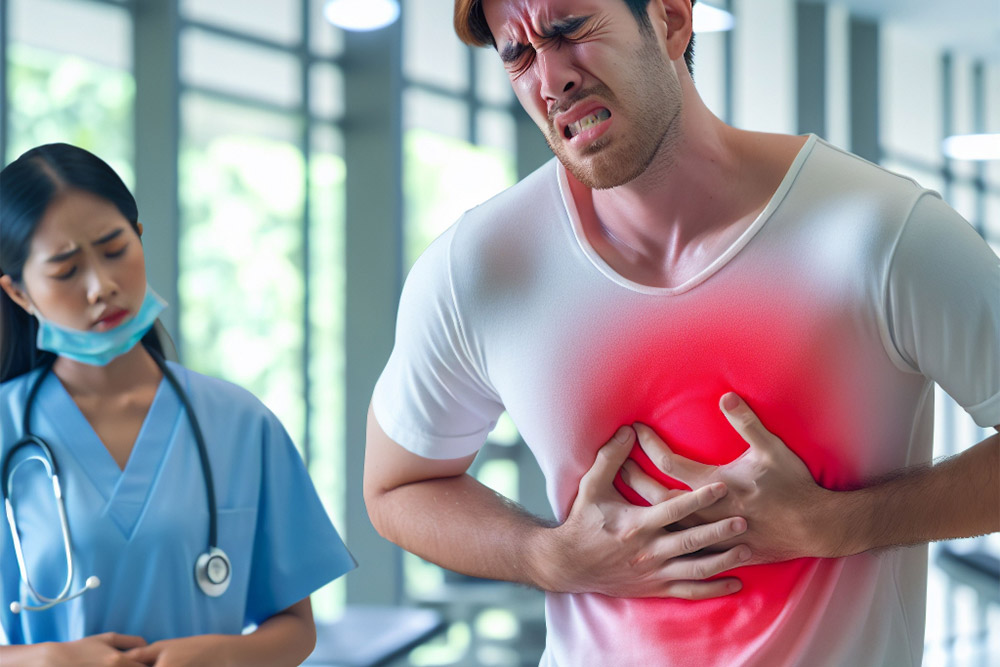
Heartburn or Acid reflux is a typical digestive disorder that may occur at any moment. But did you know that your weight can contribute significantly to the frequency of the burning in your chest? This article discusses the relationship between heartburn and obesity, why gain of weight increases the severity of acid reflux, and demonstrates that weight loss can also help relieve the symptoms of GERD. We will also point out the symptoms of acid reflux in overweight adults and provide you with straightforward guidance on how to tackle your weight and your discomfort.
Dr. Bharat Pothuri of Gastrodoxs, Houston based will provide insights throughout this post. You may be living in Houston or simply seeking reliable tips, this is where you will get straightforward and friendlies tips. We will do the minimum of jargon and provide links to reputable organizations such as the Mayo Clinic and the National Institutes of Health to do additional research.
Acid reflux occurs when stomach acid is reversed up into your esophagus (professionally, the passage where food moves in and out of your mouth to your stomach). This retrograde annoys the esophagus lining leading to:
Doctors refer to it as GERD (gastroesophageal reflux disease) when the frequency of acid reflux exceeds 2 times a week. The Mayo Clinic guide on GERD states that a quarter of the population in the US experiences GERD symptoms occasionally.
Studies have indicated clearly that excess weight is associated with reflux problems. In simple terms: excess weight around your belly would increase the pressure on your stomach which may cause acid to be produced upwards. This causes increased refluxes.
Extra belly fat places actual strain on your stomach, according to Dr. Bharat Pothuri of Gastrodoxs in Houston.
You might notice the difference already, even though you have gained as little as 10 20 pounds. Research indicates that a slight increase in weight has the potential to increase your risk of GERD. A large study reported that with each 10 pounds of weight gain, the incidence of heartburn increased by approximately 10 -12 percent.
Heartburn and obesity are like thieves in the night. The fatter you are the more frequent you are likely to have reflux.
In its overview of obesity, the NIH said that close to 42 percent of adults in the US are obese. A large proportion of them complain of frequent acid reflux.
The additional weight might be part of the cause, in case you observe these signs more frequently.
It does not take you so far as to the state of “perfect. Even the slight decrease in pounds is helpful as Dr. Bharat Pothuri explains:
5-10% of your weight, and halve the number of attacks of reflux. You relieve the strain on your stomach and make the LES be more effective.
Always make time to consult a doctor prior to taking new medicines. Gastrodoxs provides individual plans in Houston. Dr. According to Dr. Bharat Pothuri, “When diet, weight loss, and OTC drugs do not respond in a few weeks, a GI evaluation is needed.
| Feature | Normal Weight Adult | Overweight/Obese Adult |
| Abdominal Pressure | Reduced | Increased |
| LES Strength | Normal | Weakened |
| Frequency of Reflux Episodes | 1-2 times/week | 3 or more times/week |
| Heartburn Severity | Mild to Moderate | Moderate to Severe |
| Threat of Hiatal Hernia | Reduced | Increased |
| Response to Dietary Changes | Frequently adequate | Perhaps requires more vigorous action |
| Effects of 10 percent reduction in body mass index | N/A | Significant reduction (50%) |
See the Gastrodoxs or call our office in Houston to make an appointment with Dr. Bharat Pothuri.
A great solution to alleviating acid reflux is management of your weight. It does not take a lot of changes in your diet, consistent exercise, and advice of specialists, such as Dr. Bharat Pothuri at Gastrodoxs in Houston, to reduce those burning sensations and enhance your quality of life. Begin changing one habit today, One habit at a time will make your stomach grateful!
Yes. Additional weight causes your stomach and lower esophageal sphincter (LES) to be pushed in, which increases the chance of reflux.
It can never fully heal GERD, but even small weight loss usually leads to a significant decrease in symptoms.
Obesity elevates intra-abdominal pressure, reduces the LES, and may cause inflammation, which is a cause of reflux.
Furthermore, many individuals have found relief in a few weeks after losing only 5 1/2 -10 percent of their body weight.
Yes. Those that help maintain weight loss and alleviate symptoms are a reflux-friendly diet that is low in fat, caffeine, spicy and acidic foods.
Research indicates that up to 60 percent of obese adults complain of regular heartburn or acid reflux symptoms.
Exercise that is of high impact can cause a reflux. Light exercises such as walking, swimming or cycling are more acceptable.
No. It is ok in moderation to use healthy fats like avocado and olive oil. Fried and greasy foods as well as too much saturated fats should be avoided.
Infrequent use is not harmful. In case of common symptoms, talk to your physician about the use of H2 blockers or proton pump inhibitors (PPIs).
The Obesity Statistics provided by the NIH and the GERD guide of the Mayo Clinic can be considered trusted sources.